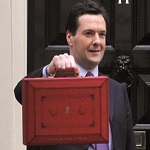Representatives of the property and mortgage industries have warned of the potential risks of a tax relief reduction for landlords, following today’s Summer Budget. Chancellor George Osborne announced that from April 2017 the government will limit mortgage interest relief for residential buy-to-let properties to the base income tax rate. “Buy-to-let landlords have a huge advantage in […]
Representatives of the property and mortgage industries have warned of the potential risks of a tax relief reduction for landlords, following today’s Summer Budget.
 Chancellor George Osborne announced that from April 2017 the government will limit mortgage interest relief for residential buy-to-let properties to the base income tax rate.
Chancellor George Osborne announced that from April 2017 the government will limit mortgage interest relief for residential buy-to-let properties to the base income tax rate.
“Buy-to-let landlords have a huge advantage in the market as they can offset their mortgage interest payments against their income, whereas homebuyers cannot, ” he said, explaining the move, which is aimed to even the playing field for people buying a home to leave in and those purchasing a property to let.
The Chancellor said this will address some of the problems with unfair taxation in the property market. However, many industry experts are sounding alarm bells as the change may chase away landlords and result into an even bigger lack of housing stock supply in the rental market.
The Council of Mortgage Lenders (CML) sounded rather positive in its comment on the matter. Although it dubbed it a “radical change” with potentially huge system and risk challenges for the lending industry, the CML is open to work towards achieving the set goals.
Commenting on today’s announcements, CML director general Paul Smee said:
“The most significant Budget announcement for the mortgage market is the fundamental change to Support for Mortgage Interest, which will change from a benefit to a loan in 2018.
“This is a radical change and we will need time to consider it and work through the practicalities and logistics. The systems and risk challenges for our members arising from such a change are potentially huge.
“Our members already go to significant lengths to support customers through temporary periods of difficulty, and will continue to do so. We will do our utmost, whatever the landscape of State provision, to keep in their homes customers whose problems are temporary and whose circumstances will allow them to get back on track over a reasonable timeframe. But this is a change that could have wide implications.
“Other notable announcements for the mortgage lending industry include the four-year phased reduction of higher rate tax relief on buy-to-let mortgage interest payments. The phasing is important. We will need to understand whether this will have a behavioural impact on higher-rate buy-to-let landlords, but a four-year timetable does at least reduce the risk of sudden market shocks.”
*
No levelling of the playing field in IMLA’s view
Commenting on today’s announcement’s by the Chancellor, Peter Williams, executive director of the Intermediary Mortgage Lenders Association (IMLA) said:
 “With details of planning changes deferred until Friday, today’s Budget delivers significant changes to tax relief for buy-to-let mortgages and also Support for Mortgage Interest (SMI) payments. Given the lack of prior consultation on either measure, it is a relief that the timescales leave room for lenders and borrowers to adapt.
“With details of planning changes deferred until Friday, today’s Budget delivers significant changes to tax relief for buy-to-let mortgages and also Support for Mortgage Interest (SMI) payments. Given the lack of prior consultation on either measure, it is a relief that the timescales leave room for lenders and borrowers to adapt.
“Reducing landlords’ mortgage tax relief is likely to prove a populist measure but the idea that tax benefits have been a big driver for growth in the private rental sector is flawed. Unlike homeowners, private landlords are still subject both to capital gains tax and tax on rental income, subject to allowable deductions for most costs. It also overlooks the fact that two in three properties entering the private rental sector since 2007 have done so without the support of buy-to-let mortgages.
“Anyone expecting this change to result in a great levelling of the playing field in the housing market is destined to be disappointed. Following comments from the Bank of England last week, it is also a worrying sign of the growing trend to talk down buy-to-let and the private rental sector, rather than address the chronic lack of housing that is putting such pressure on first time buyers as the UK population grows.
“The fact the government will only provide SMI payments as loans from 2018 shows it wants homeowners to stand on their own two feet financially. But with rates certain to rise by then, the move is likely to increase the pressure on those households who are already the most vulnerable. Presumably government will provide the new SMI loans rather than expecting lenders to do so. But it remains to be seen what further steps will be taken in the meantime to create a fairer housing market that puts less pressure on individuals’ household finances.”
*
Private rental sector will pay the price of a so called “level playing field” (eMoov.co.uk)
Russell Quirk, founder and CEO of online estate agent eMoov.co.uk, commented:
“George Osborne’s intention to level the playing field between landlords who buy property to let and those who buy to live, is going to have financial consequences for renters in the private sector.
Landlords are going to be up to 20% worse off as previously enjoyed tax relief rates of up to 45% soon disappear. Based on the average rent they could be up to £2000 worse off each year. I can only see the result being an increase in rental prices which in turn further hampers those trying to save to get on the property ladder.”
*
Unintended consequence of buy-to-let changes will be rise in rents (ARLA)
David Cox, managing director of the Association of Residential Letting Agents (ARLA), said:
“In a bid to limit the growth in buy-to-let properties, the Chancellor has announced plans to reduce the amount of tax relief investors can claim on mortgage interest payments. At a time when the supply of rental property is already struggling to meet demand, it is dangerous to try and reduce growth in the rental market.
“The Chancellor has also replaced the wear and tear costs to a new system that means landlords can only deduct the exact amount that they will incur. However, the unintended consequence of this, and the reduction in income tax is that landlords will seek to recoup their costs by hiking up rents. As a result, tenants will have to save for longer to be able to afford a deposit for a house, as more of their income will be eaten up by rent. This creates a vicious circle where tenants are renting for longer because the hope of owning a home becomes less achievable. The Government needs to think about the market more holistically and while the rental market remains such an important tenure, we need to find the right balance between landlord taxation and tenant aspiration.”
*
John Goodall, CEO of peer-to-peer mortgage lender Landbay, said:
 “It may be fun to pillory landlords or make for good Punch and Judy politics, but the claim that landlords have a tax advantage over owner occupiers is nonsense.
“It may be fun to pillory landlords or make for good Punch and Judy politics, but the claim that landlords have a tax advantage over owner occupiers is nonsense.
“In the past homeowners were taxed on the rents the property would earn if it was rented so that both landlords and homeowners were equal – but that was scrapped in the 1960s. If we still had this system homeowners would pay far more tax today. And unlike landlords, homeowners are exempt from capital gains tax. Buy-to-let is a business, and businesses pay tax on profits which is why until now interest on mortgages is tax free for them.
“These changes mean that landlords need to avoid binge borrowing and it means that lenders need to make sure that landlords borrow sustainably, by having high underwriting standards. Everyone in the property market benefits from a stable private rented sector.
“The debate on this tax grab on landlords will be loud and long, but when the dust settles nothing much will have changed: professional landlords that don’t borrow too heavily will easily be able to take this in their stride.”
*
Andy Knee, chief executive of outsourced property services provider, LMS said:
“The restriction to Buy-to-let tax relief is a serious blow for landlords, which is likely to reduce their appetite for gearing within their portfolios. However, the move is likely to be welcomed by First Time Buyers who may find securing their chosen property a little easier as a consequence. Rising house prices in London and the areas around the commuter belt have created a generation of squeezed renters, unable to save enough for a deposit on a first home, who find that limited housing stock, a falling turnover of homes, and competition from tax subsidised landlords has barred them from the market. Reducing these subsidies won’t solve the housing crisis, but it does shift the playing field a little in favour of first-time buyers. Of course, landlords can reduce the impact of the Chancellor’s tax-grab by ensuring they have the most competitive mortgage deal on each and every property in their portfolio and this could lead to a remortgage bonanza for brokers and lenders alike.”
*
Jane Guaschi, business manager at Direct Line for Business, commented:
“The reduction of mortgage tax relief for owners of buy-to-let properties will have a significant impact on the income generated by landlords across the country. It may see landlords forced to increase rents for tenants, or to leave the market reducing the housing stock available for rent. Landlords will also have fewer funds to invest in the upkeep of their properties.”
*
Read more about today’s housing policy announcements here














